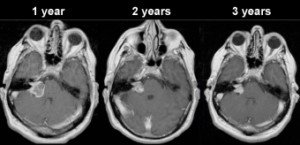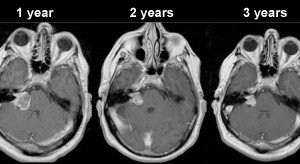Higher radiation doses for acoustic neuroma can actually damage hearing, but are lower doses enough to destroy this tumor or at least stop it from growing more?
When radiation is used, the vast majority of these benign tumors do not grow back, points out Maria Werner-Wasik, MD., an associate professor of radiation oncology at Jefferson Medical College of Thomas Jefferson University, in a report.
Could lower doses of radiation treat acoustic neuroma as effectively as higher?
• The researchers compared two groups: 74 patients who received small but daily doses of radiation, and 41 patients who also received daily small doses—but smaller than in the first group.
• Local tumor control for both groups was the same.
• Toxicity to the fifth and seventh cranial nerves was the same in both groups.
• However, hearing preservation in the smaller-dose group was better.
“We think the lower dose level is associated with equally good local control and better hearing preservation,” says Dr. Werner-Wasik in the report.
Two additional benefits of the smaller doses of radiation are those of fewer visits and shorter treatment times.
Dr. Werner-Wasik also adds that similar results were found by other researchers.
Gamma Knife (targeted radiation) treatment is becoming more common for patients with acoustic neuroma, for which surgical resection causes permanent hearing loss for most patients.
Dr. Werner-Wasik aims to continue the research using even smaller doses of radiation for treating acoustic neuroma, which is a benign tumor.
It’s estimated that between 2,000 and 3,000 Americans are diagnosed every year with it.
What Kind of Doctor to See After Acoustic Neuroma Removal
“In modern acoustic neuroma surgery, the surgical team consists of a neurotologist and a neurosurgeon,” says Ted McRackan, MD, MSCR, Director, Skull Base Center; Assistant Professor, Department of Otolaryngology – Head and Neck Surgery, Medical University of South Carolina.
“Depending on the practice setup, you may follow up with one or both of these physicians after surgery.”


 In addition to acoustic neuroma,
In addition to acoustic neuroma, 







































